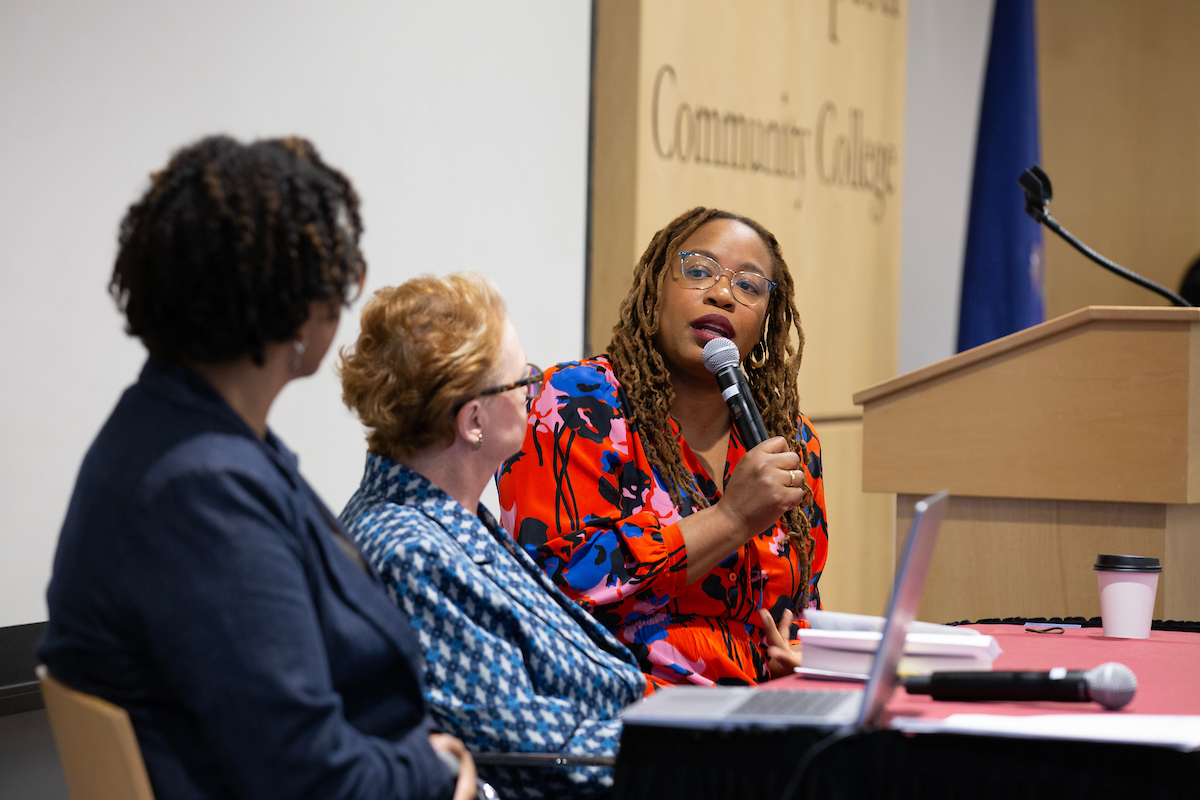
After nearly 20 years at Demos, including four as president, Heather McGhee had a crisis of faith. The liberal think tank developed evidence-based policy solutions to economic inequality and presented them to Congress, state houses and executive suites. What Demos was doing wasn’t working, McGhee believed, and she needed to understand why.
McGhee shared her journey and findings in her book, The Sum of Us: What Racism Costs Us and How We Can Prosper Together, the topic of her talk at Northampton Community College (NCC) on February 29. The book spent 10 weeks on the New York Times bestseller list and was long-listed for the National Book Award and Carnegie Medal for Excellence in Nonfiction, among numerous other awards.
Leaving Demos, McGhee traveled with her husband and their young son in an RV from California to Mississippi to Maine and back again, seeking to find out why, as she puts it, the United States "can’t have nice things" like paid family leave, universal child care and health care, a well-funded public school in every neighborhood, and a world-class infrastructure.
She concluded, “Our collective economic progress is being held back by a lie, and that lie is the lie of the zero-sum game. It's a worldview that says there's kind of a fixed pie of well-being, and if I get a bigger slice, you have to get a smaller slice.”
Those who view the world through a zero-sum lens believe that racial and ethnic groups are competing with one another for dominance, status, and belonging, McGhee explained. Research shows that white Americans are far more likely to hold this belief than Americans of color.
Seeking the origin of this perspective in the U.S., McGhee found it in the colonial plantation class that gained inordinate wealth from an economic model based on stolen people.
“You have to justify something like that. You have to tell stories, and those stories have to be echoed in the church. They have to be echoed in Common Sense, in the early forms of media and in the laws and the rules and in the norms and standards of the time," said McGhee.
European indentured servants and enslaved Africans were on the same side against the ruling class, McGhee explained, in a struggle that included uprisings such as the burning of Jamestown in Bacon's Rebellion. The ruling class divided them with a racial bargain that stripped privileges and properties from Blacks and gave them to whites.
“So this racial zero-sum says, ‘Side with your color, not your class,’” said McGhee.
The idea of the racial zero-sum game is a lie, she added.
“Economists calculate that inequality costs us growth — that the Black-white economic divide costs the US GDP $16 trillion over the past 20 years,” said McGhee.
She discussed the federal government’s investment in public goods through the New Deal, such as affordable housing subsidies, the G.I. Bill, labor laws, and the Social Security Act. This helped create the greatest middle class the world had ever seen, she said, but the benefits were largely reserved for whites only.
The federal government funded nearly 2,000 public swimming pools, but when communities faced pressure to allow Blacks to use them, many cities drained them and covered them over with dirt and gravel rather than integrate. Others sold or leased their pools for $1 to a private entity such as the local YMCA, which then created a membership roster that only included whites.
“I think it is a truly apt image-symbol for a broader phenomenon in American society,” said McGhee, “and I call it ‘drained-pool politics.’ It’s when white Americans who have been trained to disdain and distrust their neighbors of color are then asked to share something publicly with them and would rather go without a public thing, to pay for it privately, rather than be put on equal footing.”
In the wake of the Civil Rights Movement drained-pool politics resulted in a significant drop in support among white voters for proposed government programs, such as guaranteed jobs and universal basic income. “There was a massive ideological shift away from public solutions once the government [stopped] being the enforcer of the racial hierarchy,” said McGhee.
In a society where the ruling faction has divided us by race, finding solutions to our common problems takes a deliberate, race-conscious creation of solidarity across racial lines, said McGhee. The good news is that this is happening, she added, as stories of “solidarity dividends” as The Sum of Us illustrates.
“The thing that gives me so much hope about this country is that despite the faction that has continued to sell the racist zero-sum story for its own profit, a cross-racial, anti-racist majority in this country has woken up, has had their consciousness raised, has felt active, and has exercised their civic participation. And, this is happening all over the country.”